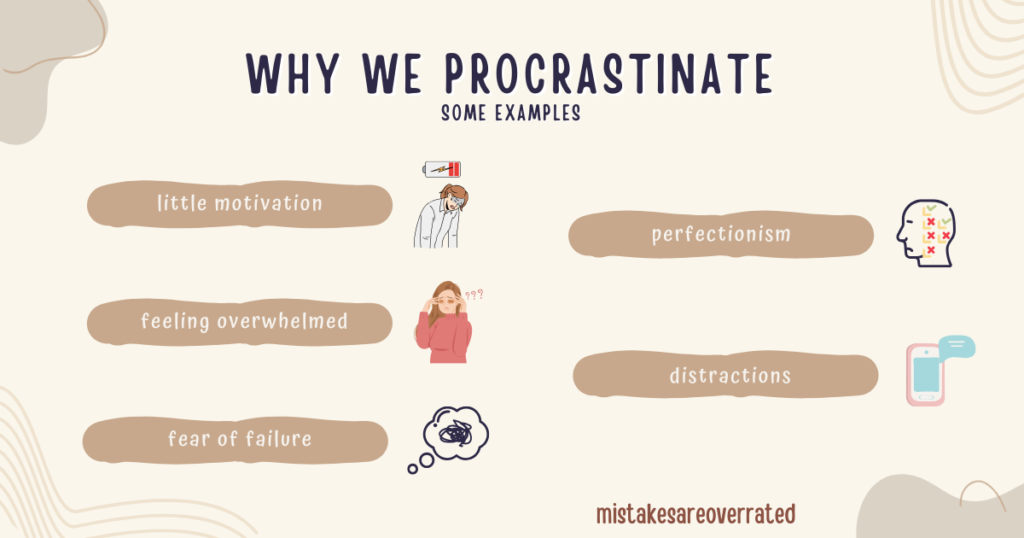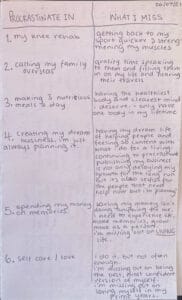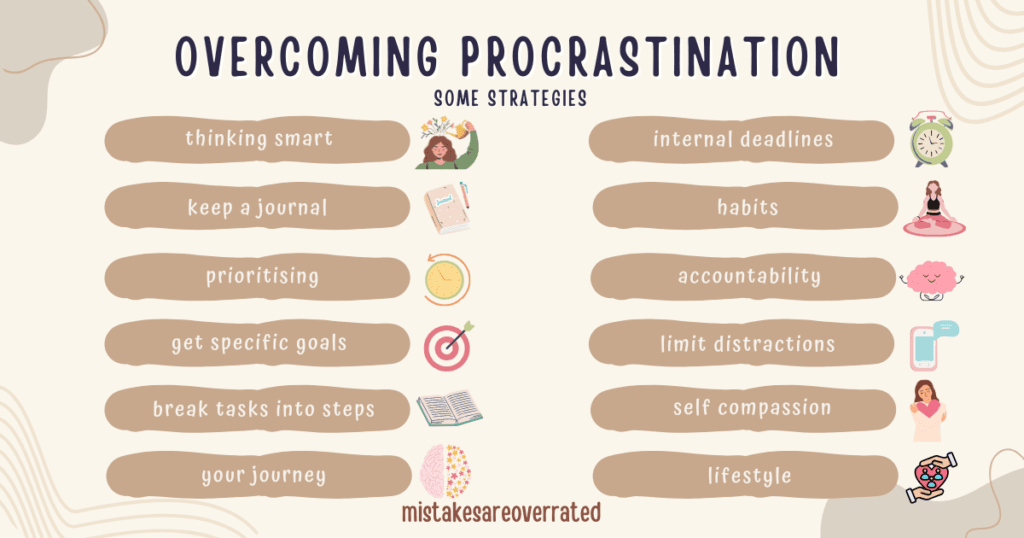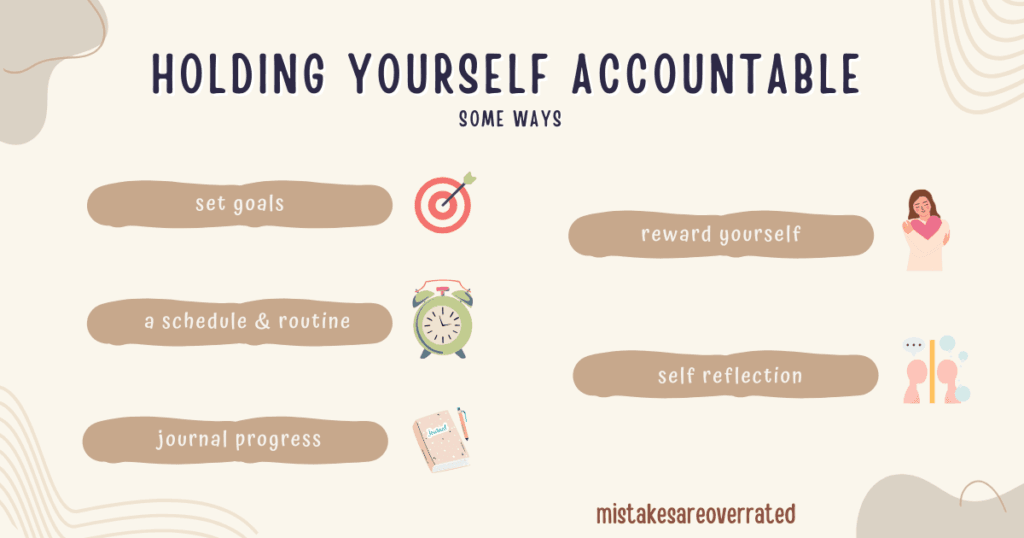procrastination is a self defeating pattern, which essentially postpones your dreams.
these are the best tips that helped me overcome this mindset, (i was literally the “pro” in procrastination).
with focus, effort and determination you are also able to teach your brain to snap out of procrastinating.
lets learn some of the best strategies to overcome this mindset.
understanding why we procrastinate
before you can tackle procrastination, it is helpful to figure out why it is happening.
a few common reasons procrastination tends to stem from are;

lack of motivation
when a task doesn’t feel rewarding or excites us (is boring), we can struggle to feel motivated or get the energy to begin.
feeling overwhelmed
when we are faced with certain tasks (harder, bigger or scarier), it can sometimes feel daunting.
this can cause us to feel overwhelmed or anxious, and our brains make excuses for us to avoid starting.
fear of failure
sometimes we delay even starting tasks due to being afraid we won’t do it perfectly, or be up to our personal standards.
perfectionism
a very recurring statement i hear people say is, ‘i’m waiting for the perfect time” before starting something.
this not only holds you back in the ‘planning’ stage, but it can also keep you stuck in a cycle of putting it off altogether.
distractions
we have social media at our fingertips, tv’s everywhere, and all the other forms of entertainment surrounding us.
these can constantly be pulling our attention away from our ambitions, dreams or important tasks.
i used to blame circumstances and other people on why it took me longer to get things done.
once i realised the truth is, i am actually the one choosing to procrastinate, the sooner i was able to overcome it.
we need to accept this is an aspect in our life we need to work on.
you need to create a desire to put your procrastination to an end.
through determination and dedication, you can prove to yourself that you’re actually wanting to change by your small daily gestures.
figuring out what you procrastinate in
i recommend having a journal, a whiteboard, or something you can physically write on.
write down “what do i procrastinate in” and identity them clearly.
writing them down allows you to have a visual on what your main weaknesses are, so you can begin to work on them.
examples:
cleaning your home? starting your business? daily exercise? not returning calls to family? postponing appointments? paying your bills? car service?
writing a list of the things you procrastinate in is one thing, but realising the goals you didn’t achieve due to procrastination is another.
make a column next to your list you just wrote.
this column is the goals or achievements procrastination has taken from you.
this will open your eyes and make you even more determined to get rid of this pattern.

strategies to overcome procrastination
please remember consistency is key when it comes to overcoming procrastination.
here are the best strategies i found helped the most.
thinking smart
– are you a morning or night person?
if you’re a morning person then tackle your most difficult tasks and responsibilities before lunch.
this is when you will be most energetic and productive.
– figure out what tasks you don’t enjoy the most (in the list of most important tasks) and do those first.
make it your daily habit to tackle the tasks you dislike first.
overtime they become easier for you to do and eventually, they wont be as unpleasant.
i used to do the opposite and leave the worst to last, but i found myself dragging out the other tasks just so i could avoid doing it for longer.
swapping my tasks around allowed me to save time by not procrastinating,
but i also found myself actually looking forward to finishing my list so i could get to the last task (the most enjoyable one).
keep a journal
having your goals on paper is more effective as you can focus on the task until it is completed, then you take it off the list.
this gives you a feeling of accomplishment and you want to do the next task so you can cross that one off the list too.
a journal for procrastination can be used for your goals, daily to-do-lists, self reflection, to track your progress and much more.
prioritising
learn to prioritise your tasks and assign them to top priority.
what i mean by this is, decide what tasks can be done later on in the week, and what needs to be done immediately.
as procrastination is the opposite of action, once you have decided on your tasks prioritisation, you need to take action – actually do them.
set specific goals
make sure the goals you set are not only specific, but are also achievable.
i am by no means telling you to not dream big, please still reach for the stars.
but, as you’re trying to stop procrastinating, make sure the goals you set are ones you believe you can accomplish.
setting specific goals can make it easier for you to start, as you have a clear direction to follow.
instead of “i’ll write the email later on in the week” try “thursday i am setting an hour aside between 10-11 to write my email”

break your tasks into steps
one of the biggest reasons people procrastinate is because the tasks seem too big or overwhelming.
when it feels like it’s too much to handle, it becomes easier to just put it off indefinitely.
breaking your tasks down into more manageable, smaller steps can help you with this problem.
the task will feel less intimidating when you focus on completing one small step at a time, and this way you’ll be more likely to start.
you also get a sense of progress with your small accomplishments, making it easier for you to keep going.
i also like to make games out of what i don’t like to do or the tasks that are repetitive or ‘boring’.
example: with repetitive tasks, i do them to a beat like it’s a song, or i do them in small parts going down the list instead of one at a time.
it’s about your journey
make sure you aren’t solely fixated on the end results, instead, enjoy the journey you are on.
focus on making progress and be one with your journey to achieving your tasks or goals.
perfectionism can lead to procrastination due to the fear of not doing it perfectly.
remind yourself it is more important to begin and get it done, than to wait until everything is ‘perfect’.
start with completing a draft, even if it’s imperfect, as you can always tweak it later.
setting internal deadlines
when there’s no external pressure on you, it is easier to keep pushing back the deadlines.
this is common for self employed people, or working towards a side hustle or your dreams.
to eliminate this, i like to create specific internal deadlines.
being time bound makes it easier to take action, as it creates a sense of urgency to help you accomplish your tasks.
once you have broken your task into smaller steps, give yourself a sort of deadline for each step, or a to-do-list.
you may find sharing your goals with your family, a friend or coworker can help you stick to your deadlines, as they can check in on your progress.
also it may give you that extra push you need, as you know someone is aware of your goals.
habits
we are creatures of habit, so even when we know something isn’t benefiting us, we still continue to do it anyway.
once in awhile you will stray away from your intentions due to limitations, temptations or just out of habit.
that is okay as all of us would love to be 100% dedicated to 1 thing 100% of the time, but in reality that is most likely not going to happen.
you need to discard your old habits and remind yourself why you’re doing this and how it is benefiting you.
create a daily routine that has designated times for your tasks, as this helps build the habit of productivity.
a consistent schedule can help you recognise when it is time to double down and focus, and when it’s time to rest.
over time these habits will make it easier for you to stay productive without struggling against procrastination, (remember, consistency is key)
hold yourself accountable
accountability can be an incredibly powerful motivator.
holding yourself accountable requires self discipline and determination, it doesn’t always come down to feeling motivated.
when you hold yourself accountable, you are able to take responsibility of your time and what you chose to work on.
your decision making improves as you fulfil the tasks and goals you set for yourself.
it takes practice and time learning to hold yourself accountable, and it does require effort.
learning to hold yourself accountable
i began by starting small (after i realised i’m not going to wake up and be an accountability expert queen).

– set your goals
think attentively to the goals you aim to accomplish, as you need to own what you set to do.
– create a schedule and routine
creating a schedule in your daily routine helped me immensely with holding myself accountable.
– journal your progress
i enjoyed journaling my progress throughout my journey, no matter how small.
i found countless times i forgot the progress i had made, until i looked back on my journal and actually read what i had achieved.
– make sure to reward yourself
this is a big one for me as it provides me with additional motivation and also makes me look forward to accomplishing more goals.
– self reflection time
one of the most important steps when holding yourself accountable – self reflection.
this is when you can reassess how everything is going, write what you’re proud of, make any adjustments, ect.
i like to ask myself “am i expecting too much of myself?, do i need to be doing more? what areas do i dislike and enjoy? am i sticking to my goals?”
turn off that damn phone and eliminate your distractions
keeping your phone near you is a good idea when you’re awaiting important emails or calls,
but if you know you will be too tempted to look at your phone with every notification you get, put your phone away.
you don’t realise how much time you actually spend on your phone until you become actively aware of it, or check your screen time.
creating personal limits to have free time on your phone in the day is helpful.
this way you won’t be mindlessly scrolling, just to waste time or to put off that important task.
you can set your phone to “do not disturb”, put an app blocker on, or put it in another room while working.
we live in a world full of distractions, and they can be a huge culprit when it comes to procrastination.
the lure of social media, phone notifications, and other interruptions can easily derail your focus and make it harder to stay on track.
engage in self compassion
procrastination can lead to negative emotions and feelings, such as blame, shame, guilt or frustration.
try not to be too hard on yourself, so instead of beating yourself up, practice self compassion.
acknowledge that procrastination is a common challenge we face, and remind yourself that it is okay to slip up sometimes.
forgive yourself if you fail to meet a goal, refocus and then get back on track.
self compassion can help improve your motivation, create belief in your abilities and can promote a growth mindset.
i found saying daily affirmations helped remind me to stay on track and finish the tasks i needed to accomplish.
they are also great for encouragement and believing you can accomplish what you set your mind to.
affirmations are an amazing tool to help you positively change your mindset and beliefs about yourself, i highly recommend.
don’t forget to reward yourself for your accomplishments aswell!
we tend to get so swept up with just a ‘do do do’ attitude that we forget how much we have got done.
make sure you congratulate yourself, as it will encourage you to keep ticking off your tasks because you’re proud of yourself.
lifestyle
sometimes we procrastinate because we’re overwhelmed by the enormity of what we have to do.
we don’t have to drastically change our life in order to stop procrastinating,
we just have to manage the life we have.
the more and more you delay, the more dissatisfied you may feel with your life.
there is nothing wrong with asking for help. whether thats your family, your teacher or a professional.
sometimes we procrastinate so much due to having a jam packed schedule.
just remember that it is okay to ask your partner to help you with the chores and to clean the living room.
it is okay to ask your teacher to go over a question you’re spending hours trying to understand.
it is okay to get a tax agent to help you with your taxes this year so you have a few extra hours to do important tasks.
reminder
some of these tips above will resonate and work for you, but some won’t be much help, and that is okay.
like most of my guidance posts, it all comes down to trial and error.
you need to try new ways to find out what helps you the most, as every individual is different.
what helped me or another person, won’t necessarily mean it will help you aswell.
you need to be in control of your own time and your own life.
by eliminating procrastination, you will find yourself having more time on your hands than you thought you would have.
there is no instant remedies or miracle cures that can make you have more time,
you’re the only one who can manage the amount, or in this case, the absence of productivity in your life.
success is only a step away, reach for the sky.
you’ve got this
-MAO
don’t give trauma the power to control you, you deserve to live how you want. take control of your trauma.
-life advice from one survivor to another

Leave a Reply